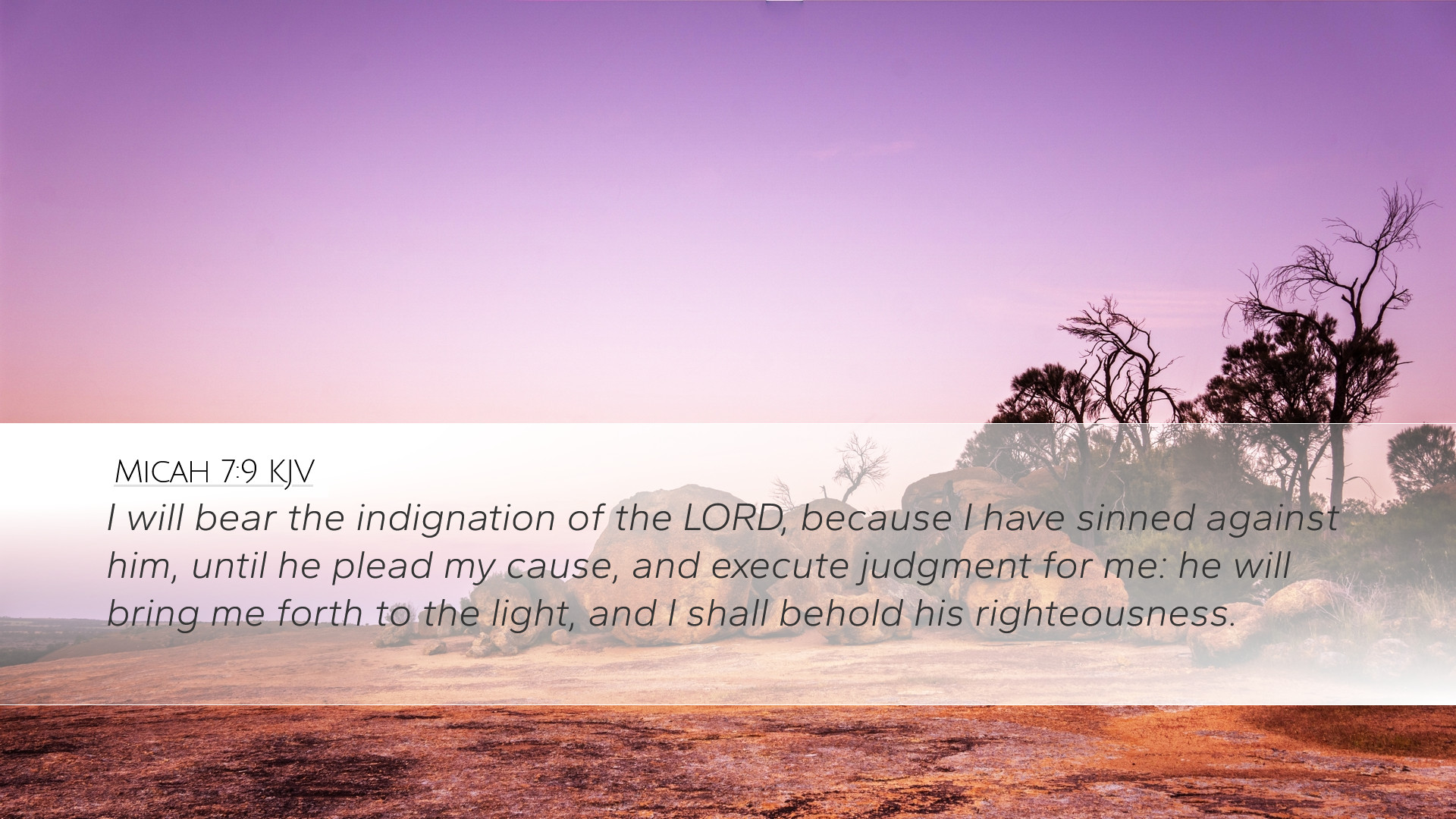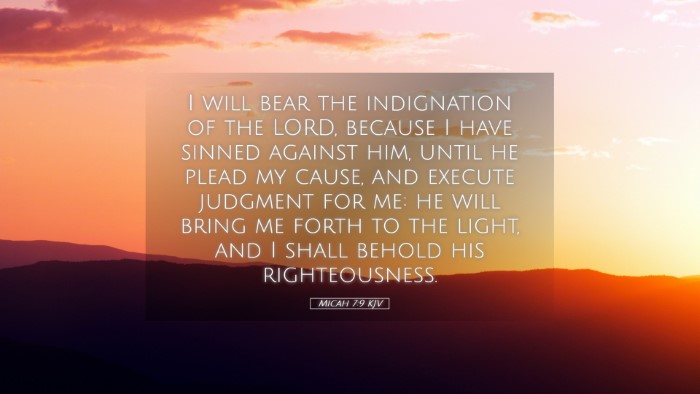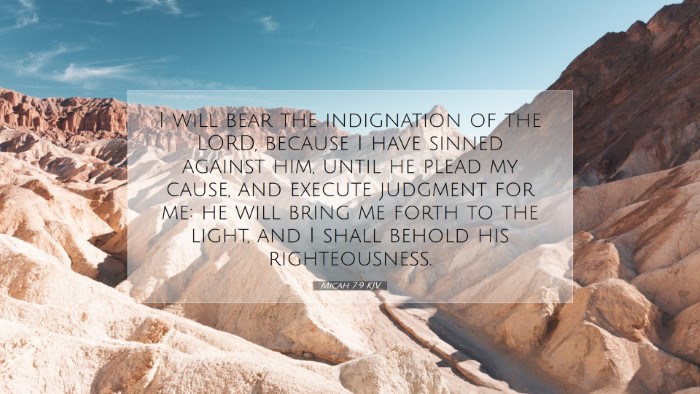Old Testament
Genesis Exodus Leviticus Numbers Deuteronomy Joshua Judges Ruth 1 Samuel 2 Samuel 1 Kings 2 Kings 1 Chronicles 2 Chronicles Ezra Nehemiah Esther Job Psalms Proverbs Ecclesiastes Song of Solomon Isaiah Jeremiah Lamentations Ezekiel Daniel Hosea Joel Amos Obadiah Jonah Micah Nahum Habakkuk Zephaniah Haggai Zechariah MalachiMicah 7:9
Micah 7:9 KJV
I will bear the indignation of the LORD, because I have sinned against him, until he plead my cause, and execute judgment for me: he will bring me forth to the light, and I shall behold his righteousness.
Micah 7:9 Bible Commentary
Commentary on Micah 7:9
Verse: "I will bear the indignation of the Lord because I have sinned against Him, until He pleads my cause and executes judgment for me. He will bring me forth to the light; I will see His righteousness."
Introduction
This verse serves as a profound expression of repentance and the hope that follows. Micah 7:9 encapsulates the essence of the human condition before God—acknowledgment of sin and the fervent desire for reconciliation. In this commentary, insights from public domain sources, including Matthew Henry, Adam Clarke, and Albert Barnes, will be explored to enrich the understanding of this significant scripture.
Contextual Background
Micah, a prophet from Moresheth, prophesied during a time of great moral and social decay in Israel. His messages often oscillate between grim warnings of impending judgment and hopeful declarations of restoration. The concluding chapter of Micah highlights the themes of judgment, mercy, and redemption, culminating in the personal realization of sin and the anticipation of God’s intervention.
Textual Analysis
1. Acknowledgment of Indignation
Micah begins with a confession of bearing the "indignation of the Lord." This expression signifies a deep internalization of God’s displeasure due to sin. According to Matthew Henry, this verse portrays a humble and contrite spirit, accepting personal responsibility for wrongdoing:
"It is a sign of grace to lay one’s hand upon one’s own mouth, to confess and own the sins which have drawn down the displeasure of God.”
This acknowledgment suggests not only remorse but a willingness to embrace the consequences of one’s actions as a pathway to spiritual renewal.
2. The Role of God’s Justice
The phrase "until He pleads my cause" reflects an understanding of God’s role as both judge and advocate. Albert Barnes elucidates this duality, positioning God as one who not only condemns but also redeems:
"The faithful should not despair in their times of trouble, but rather turn to God, who is faithful to plead for His people and execute judgment not for destruction but salvation."
This promotes a hopeful theology that underscores God’s commitment to justice, portraying Him as a reconciliatory figure despite human failings.
3. Hope for Restoration
Micah’s declaration, "He will bring me forth to the light; I will see His righteousness," is a beautiful affirmation of hope after despair. This imagery of light represents divine revelation and the restoration of a right relationship with God. Adam Clarke emphasizes the significance of this transformation:
"Emerging from darkness into light signifies a renewal of faith and the experience of divine grace."
This transition is essential for believers, as it acknowledges the moment when one’s eyes are opened to God’s righteousness, leading to ultimate salvation.
Theological Implications
The implications of Micah 7:9 transcend its immediate context, extending into theological discussions regarding sin, redemption, and God’s nature. The acknowledgment of sin is paramount in any restorative process, as seen in the teachings of Christ and the apostles.
- Repentance: The act of turning towards God aligns with the broader biblical narrative of repentance leading to forgiveness (1 John 1:9).
- Divine Advocacy: Understanding God as an advocate mirrors New Testament depictions of Christ as our intercessor (Romans 8:34).
- Hope and Assurance: The movement from darkness to light illustrates the Christian assurance of salvation and the transformative power of faith.
Conclusion
Micah 7:9 serves as a powerful reminder of the necessity for self-examination and confession in the believer’s walk with God. As church leaders, students of theology, and scholars engage with this text, its multi-faceted layers of meaning should inspire both personal reflection and communal instruction. Sinners, when they come to terms with their failures, can hold fast to the promise embedded in these verses—a God who is just, merciful, and ever-ready to restore those who earnestly seek Him.
Reflection Questions
- How does acknowledging our sinfulness change our approach to God?
- In what ways can we encourage our communities to embrace both God’s justice and mercy?
- What personal "darkness" can be transformed into light through God’s grace in your life?


